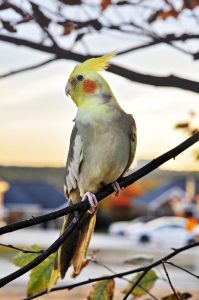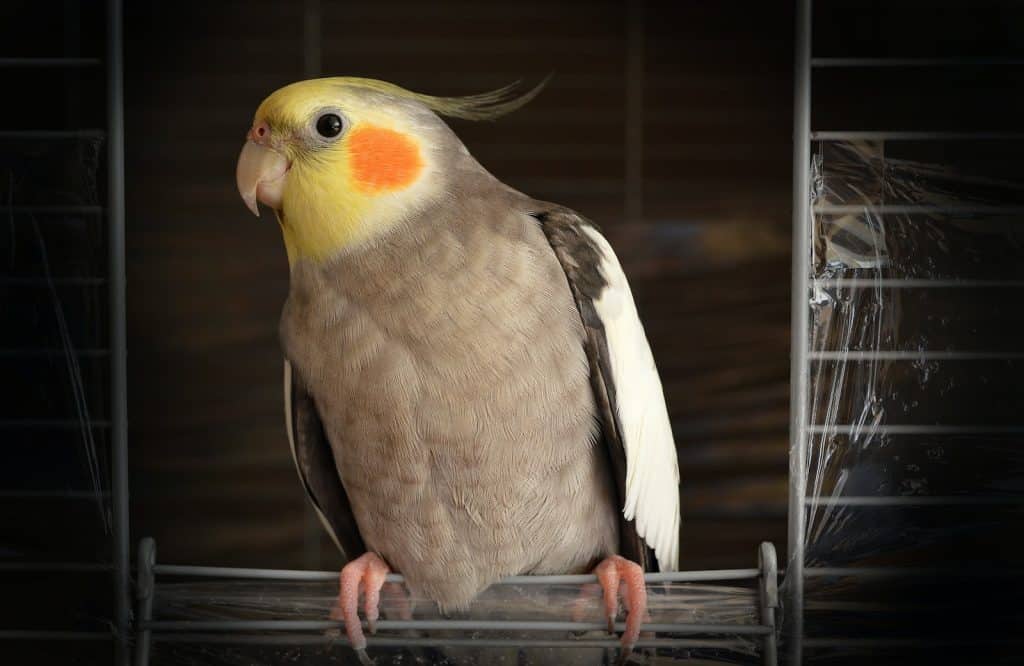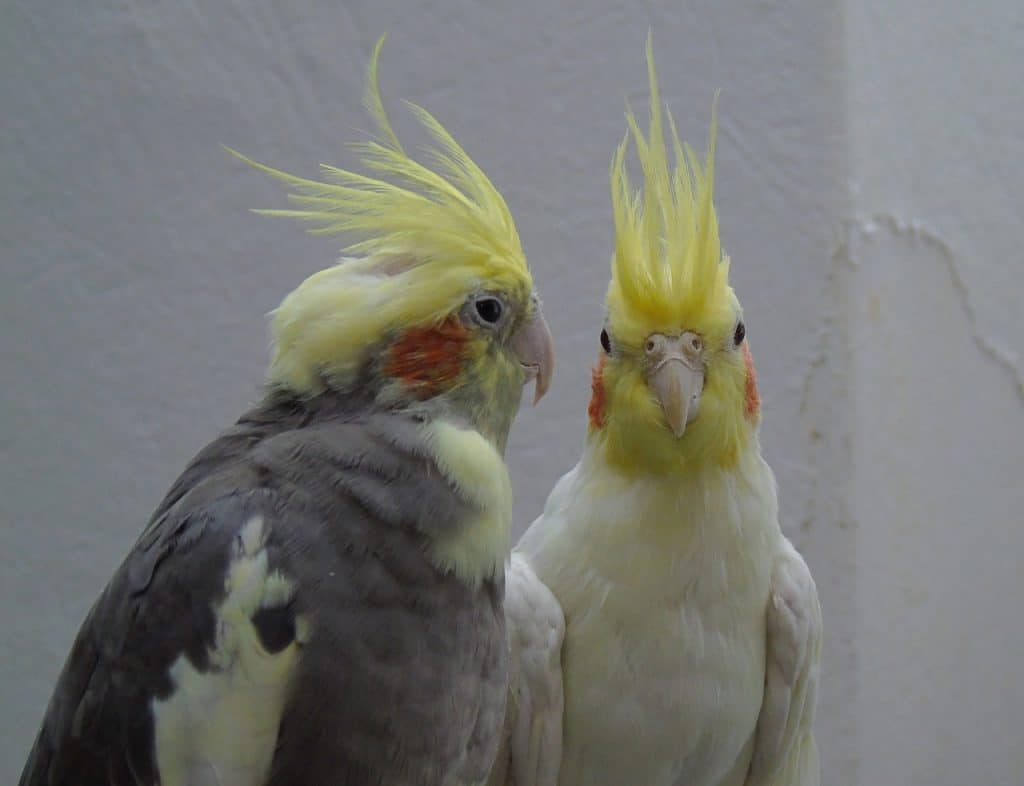Cockatiels are enjoyed by many as pets because they check a lot of boxes: They’re cute, friendly, and intelligent. If you have one then you likely know that their vibrant personality enlivens any home. However, at some point, you may have heard your cockatiel sneeze and wondered if do cockatiels sneeze and there was cause for concern.

Do Cockatiels Sneeze?
Yes. Although a cockatiel sneezing isn’t generally something to worry about, there are some exceptions. If the sneezing is producing mucus or moisture, for example, it could be cause for concern.
Parrots, cockatiels, in particular, sneeze more often than most people realize. Dust gets trapped in their feathers which causes them to sneeze just like humans when they have a cold. However, sometimes it could also be caused by an underlying health condition such as a respiratory infection.
Common Causes of Cockatiel Sneezing
Cockatiels’ sneezing is quite typical. Their feathers produce a more powdery residue than other birds. Some of the powder may get into their nose and cause them to sneeze. Other causes of sneezing include:
- Your home’s air is too dry.
- The chemicals in your cleaning supplies are harsh and can cause discomfort to your bird.
- Malnutrition
- Dust
- A stuffy, poorly ventilated environment around the bird’s cage.
- You smoke in your house
- Fungal or bacterial infections
- Viral infections
- Tumors
- Sinus blockage
As you can see, some of these typical causes are more worrisome than others. It’s critical to keep an eye on your cockatiel’s sneezes for any changes in mucus production, quantity, or frequency.

Possible Diseases Associated With Excessive Sneezing
Even though a single sneeze might not sound serious, if your pet keeps sneezing, take them to your avian vet right away. It might be possible you have a sick cockatiel.
Because cockatiels have delicate and sophisticated respiratory systems, they are more vulnerable to respiratory diseases than other animals. As a result, you should keep them away from drafts. The following are some of the most common ailments affecting cockatiels caused by excessive sneezing:
Abnormal Breathing
Your cockatiel may be having difficulty breathing due to eating Millet seeds. You should check their diet to make sure they are not consuming anything that could cause them problems.
Wheezing
As a result of difficult breathing, it produces a high-pitched whistle-like sound. It’s common while exhaling, but in severe cases, it may also be heard when inhaling. Wheezing is caused by irritation or constricted airways. It is frequently the case of dust particles or seeds trapped in the nose.
Pneumonia
If your pet cockatiel is sneezing frequently, it might be pneumonia. Pneumonia is an infection of the lungs caused by a bacterial or viral infection. The air sacs may solidify and fill with pus, affecting one or both lungs, producing acute or chronic pneumonia.
What to Do When Your Cockatiel Sneezes
Unless you are carefully monitoring your cockatiel, you may not realize it is sneezing as well as your baby cockatiel sneezing. They aren’t very loud when they sneeze because they are small birds, but a vigilant pet owner will be able to tell if their bird’s behavior has changed.
If your cockatiel sneezes, don’t assume that it’s because of their feather powder. There may be an environmental issue causing the problem. To prevent excessive sneezing you better observe your pet bird and check if there are harsh substances causing it.
If you use harsh cleaning chemicals in your home, for example, aerosol cleaners, your cockatiel could get harmed. The same may be true if you utilize strong cleaning solutions to clean out the birdcage. To avoid irritating your bird’s respiratory system, only use mild cleansers like vinegar on the cage, such as this one from Amazon.
Bird enthusiasts should take note that common indoor environmental conditions such as smoking, dry air, and dust can pose health hazards to their feathered friends. To ensure your bird’s well-being, do your best to keep the area around them clean and free of contaminants. This might include running an air purifier in the room they are kept in if any of these conditions is a problem.
Furthermore, you can help maintain your bird’s health by feeding them a well-rounded diet. Many bird owners only give their birds seeds that lack the various vitamins and minerals that birds need, one example being Vitamin A. Consequently, respiratory problems caused by malnutrition in cockatiels could be prevented if they were offered an unbiased diet of pellets, fruits, vegetables and seeds.
- Size: 8.7x3.9 inch /22x10 cm
- Made of metal, it is safe and very resistant to bite.
- Entertaining enough to keep birds busy for a long period and they do enjoy playing with it.
- The bells is sweet sound, can attract the attention of the bird.
- The toy can help pet birds to ease the unhappy moods and release the pressure to keep them stimulated and healthy mentally.
Preventing Excessive Sneezing in Pet Cockatiels
Cockatiels are delightful pet birds, known for their friendly demeanor and quirky personalities. However, just like any other pet, they can sometimes experience health issues. One common issue that cockatiel owners may come across is their bird sneezing. While it might look and sound adorable, a sneezing cockatiel can be a cause for concern, especially if it is excessive.
Cockatiels, like other birds, can sneeze for a variety of reasons. In most cases, it is normal and healthy behavior that helps them clear their nasal passages of dust, debris, and other irritants. However, excessive sneezing in pet cockatiels can be a symptom of underlying health issues, such as respiratory illnesses or viral infections.
One of the most common causes of a sneezing cockatiel is respiratory disease. Respiratory illnesses in pet birds can be caused by various factors, including bacterial, fungal, or viral infections. These infections can
lead to inflammation of the respiratory tract, resulting in symptoms such as sneezing, nasal discharge, and difficulty breathing. In some cases, a sick cockatiel may also exhibit lethargy, loss of appetite, and changes in vocalization.
Another possible cause of a sneezing cockatiel is a viral infection, such as avian influenza or psittacine beak and feather disease (PBFD). These viral infections can cause a range of symptoms in pet birds, including sneezing, nasal discharge, and feather loss. In severe cases, viral infections can be life-threatening for a cockatiel, making it essential to consult an avian veterinarian if you suspect your pet may be suffering from a viral infection.
To prevent excessive sneezing and reduce the risk of respiratory illnesses and viral infections in your pet cockatiel, it is vital to follow proper hygiene and care practices. First and foremost, ensure that your bird’s living environment is clean, well-ventilated, and free from dust and irritants. Regularly clean your cockatiel’s cage, perches, and toys to minimize the build-up of bacteria, fungi, and other pathogens.
When to Worry About Cockatiel Sneezing
A dry sneeze is not something to be concerned about, but there are several circumstances when you should be wary of cockatiel sneezes. If your bird displays any of the following behaviors or signs, you should contact your veterinarian:
- If your cockatiel is experiencing frequent sneezing and has any discharge from its runny nose, check its nose for blockages, such as a loose seed or other particles. It’s better to look with a flashlight so you can see more clearly because there may be anything obstructing their nasal passages that is causing the wet sneezing. If the discharge isn’t caused by an infection, it might be an indication of sickness.
- If you notice your pet bird sneezes more often than usual, it could be a sign of a bigger problem and you should take them to the vet.
- Red Feathers or Red Nostrils – Stained feathering is typically an indication of a disease in cockatiels and should be visible to humans. The same may be said for mucus seepage or sneezing, which causes blackened or discolored feathers around the beak. Any of these is a cause for worry and must be treated as soon as possible.
- Lethargy and weight loss are both indicative of a more serious problem if your cockatiel has suddenly become less active or begun to lose weight, accompanied by any forms of sneezing.
- If you notice a change in the color, consistency, or frequency of your bird’s droppings, it might mean that they are sick and have an infection.
Final Thoughts on Do Cockatiels Sneeze?
There’s no need to fret if your baby cockatiels and cockatiels give an occasional dry sneeze, but take them to the avian veterinarian right away if it becomes more regular or is joined by other problems learn more about avian health. This will give you peace of mind and ensure that your bird has a long and healthy lifespan.
- Do Cockatiel Bites Hurt Are They Dangerous
- Do Cockatiels Cry
- Do Cockatiels Dance
- Do Cockatiels Eat Insects
- Do Cockatiels Get Lonely
- Do Cockatiels Like Music
- Do Cockatiels Like The Dark
- Do Cockatiels Like To Cuddle
- Do Cockatiels Mate For Life
- Do Cockatiels Need A Companion
- Do Cockatiels Need Cuttlebone
- Do Cockatiels Need Darkness To Sleep
- Do Cockatiels Need Grit
- Do Cockatiels Recognize Their Owners
- Do Cockatiels Sneeze
- Do Conures And Cockatiels Get Along
- Do Birds Know Their Names




